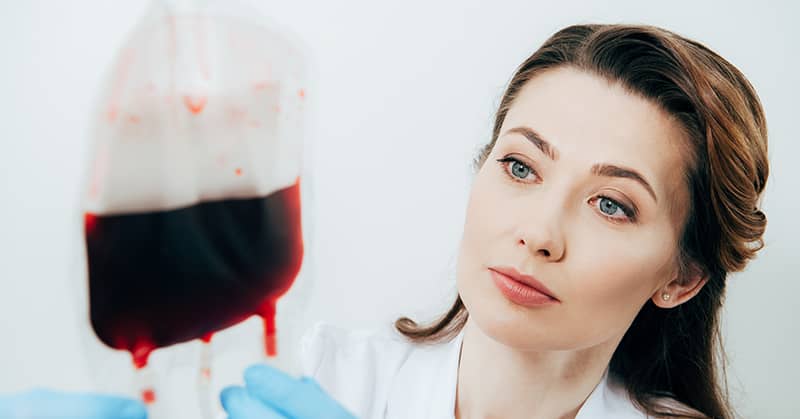
But this is no movie.
45-year-old technology entrepreneur Bryan Johnson transfused himself with blood plasma from his 17-year-old son in an attempt to turn back time. He was inspired by research by scientists rejuvenating elderly rodents with the blood of youthful, healthy rodents. Research we reported in this very newsletter.
The question is, will Mr. Johnson’s transfusion slow the pace of aging and extend his life?
Let’s take a closer look…
We first covered the beneficial effects of young blood in old mice back in 2017, when old mice injected with blood from young mice saw improvements in learning and memory.
Since then, scientists have carried out a procedure called parabiosis, whereby two mice are surgically joined so they share the same blood supply. Now we’re really in sci-fi and horror movie territory!Frankenstein or anti-aging? While the procedure may be worthy of a Frankenstein reference, rather than create a monster, scientists restored physical youthfulness to the elderly mouse. For example, the elderly mouse became more active and animated, and its muscles, liver, and brain displayed evidence of rejuvenation.
Researchers saw these dramatic results after three weeks of the two mice being physically connected. They wondered, what would happen if parabiosis was continued for 12 weeks, which is about ten percent of a mouse’s lifespan?
Scientists from Harvard and Duke University were interested in finding out.Parabiosis extends life For this follow up study, the research team connected mice aged three months to others aged 20 months. In human terms it’s the equivalent of people 18 years and 50 years of age. It’s also important to consider that twelve weeks of parabiosis is equivalent to humans being paired for eight years.
For a control, researchers also connected young mice to young mice and old mice to old mice.
They carried out blood work during parabiosis and then, two months after detachment, the team analyzed their tissues. After that these mice were allowed to live out their natural lives.
The findings, published in the journal Nature Aging in July, showed that old mice joined to young mice lived six weeks (five percent) longer than if joined to other old mice.
While it’s good news, this is not a large effect, especially when you consider that the lives of mice have been extended by up to 27 percent on a calorie restricted diet.
What was of more interest to the research team was the effect of parabiosis on the rodents’ biological age.Biological age: The most important aging marker Biological age is the age your body is physically, or medically, so to speak. Biological age does not always match a person’s chronological age, or age in years. For example, some folks might be 65 years old, but their biological age is more like 75 due to damage from high blood sugar, chronic inflammation, and other health problems.
Like many medical experts we believe that your biological age is your most important marker of aging. And our goal at Aging Defeated is to help you increase your health span and lower your biological age, so you can look and feel years, maybe even decades younger than your chronological age.
Who wouldn’t want to be 65 years old and have the body and health of a 50-year-old?
So, back to the research and the amazing results the team of scientists uncovered…Turned back the clock on biological age Immediately after detachment the researchers found that the blood and liver of the old mice was biologically younger by a dramatic 30 percent and, “remarkably,” the scientists wrote, “this rejuvenation effect persisted even after two months of detachment.”
In addition, the old mice “showed gene expression changes opposite to aging but akin to several lifespan-extending interventions.” Among these age reversal changes was reduced expression of inflammatory genes of the kind seen in mice on a calorie restricted diet.
Senior author James White explained, saying, “This is the first evidence that…parabiosis can slow the pace of aging, which is coupled with the extension in lifespan and health.”
As to why this occurs, Professor White admitted that he didn’t know. “Our work points to a need to explore what factors in the circulation of youthful blood cause this anti-aging phenomenon. We have demonstrated that this shared circulation extends life and health for the older mouse, and the longer the exposure, the more permanent the changes.
“The elements that are driving this are what’s important, and they are not yet known. Are they proteins or metabolites? Is it new cells that the young mouse is providing, or does the young mouse simply buffer the old, pro-aging blood? This is what we hope to learn next.”
As for the findings in our living human Mr. Johnson?Plasma alone was insufficient to restore
youthful attributes Mr. Johnson reported that after six one-liter blood plasma infusions over three months from his teenage son, and after evaluating biomarkers from fluids, devices and imaging, no benefits were detected and he’s discontinuing the treatment.
Prof. White thinks the reason for the disappointing outcome could be that only blood plasma from the teen was transfused into Mr. Johnson. Plasma makes up 55 percent of blood with the remaining 45 percent containing cells and platelets. Perhaps this is where the rejuvenation factor is found.
“The reason the parabiosis effect is so strong is probably because there’s constant exposure to all components of young blood,” Prof. White commented.Our takeaway The findings are interesting to say the least. I suspect that Prof. White is onto something. There is probably more rejuvenation going on from the other blood factors—or all the blood factors combined-- than scientists have been able to identify in research to date. More investigation is needed, and is underway. My team and I will continue to follow the ground-breaking research and keep you posted.
Best Regards,
The Aging Defeated Team
https://agingdefeated.com/controversial-young-blood-transfusions-anti-aging- breakthrough-or-bust/ Multi-omic rejuvenation and lifespan extension on exposure to youthful circulation (2023) https://www.nature.com/articles/s43587-023-00451-9 https://corporate.dukehealth.org/news/aging-process-slows-when-older-mice-share-circulatory-
system-young https://www.newscientist.com/article/2384878-young-mouse-blood-extends-lives-of-older-ones-
while-rejuvenating-them/
